07 de julho de 2025
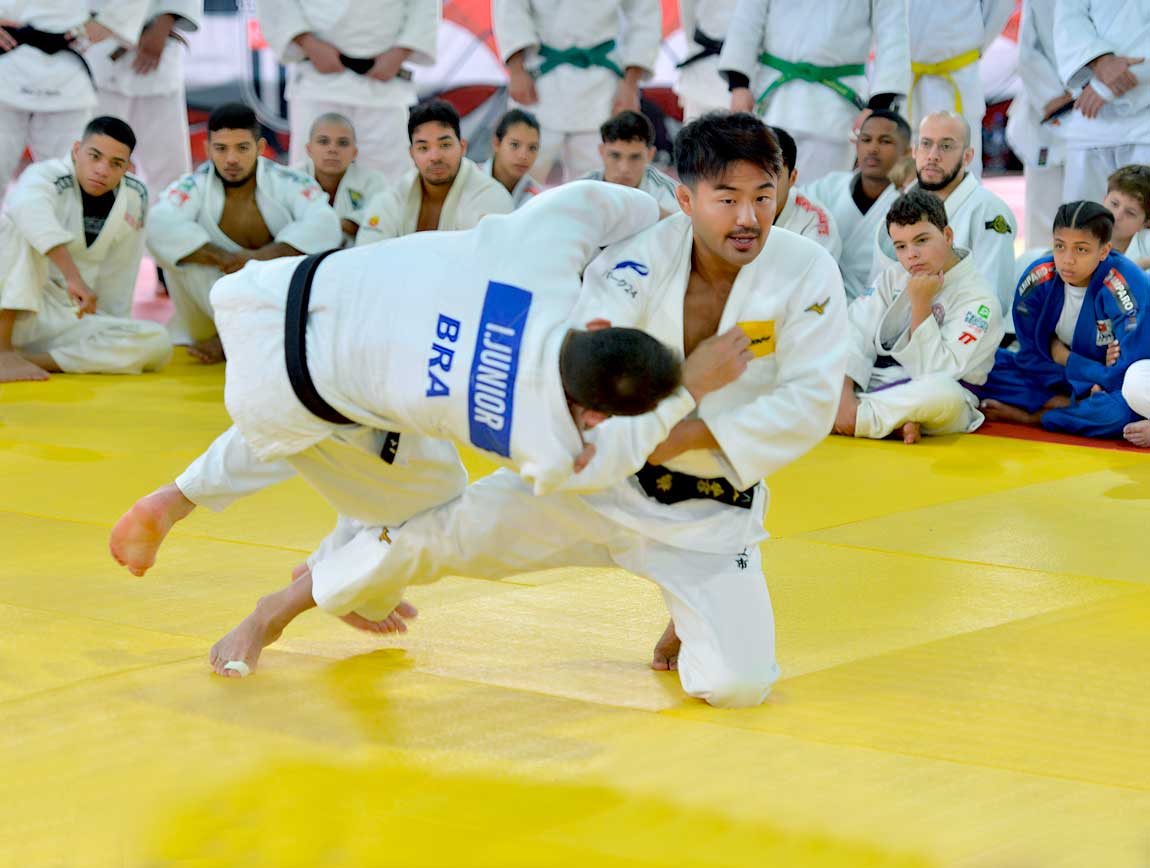
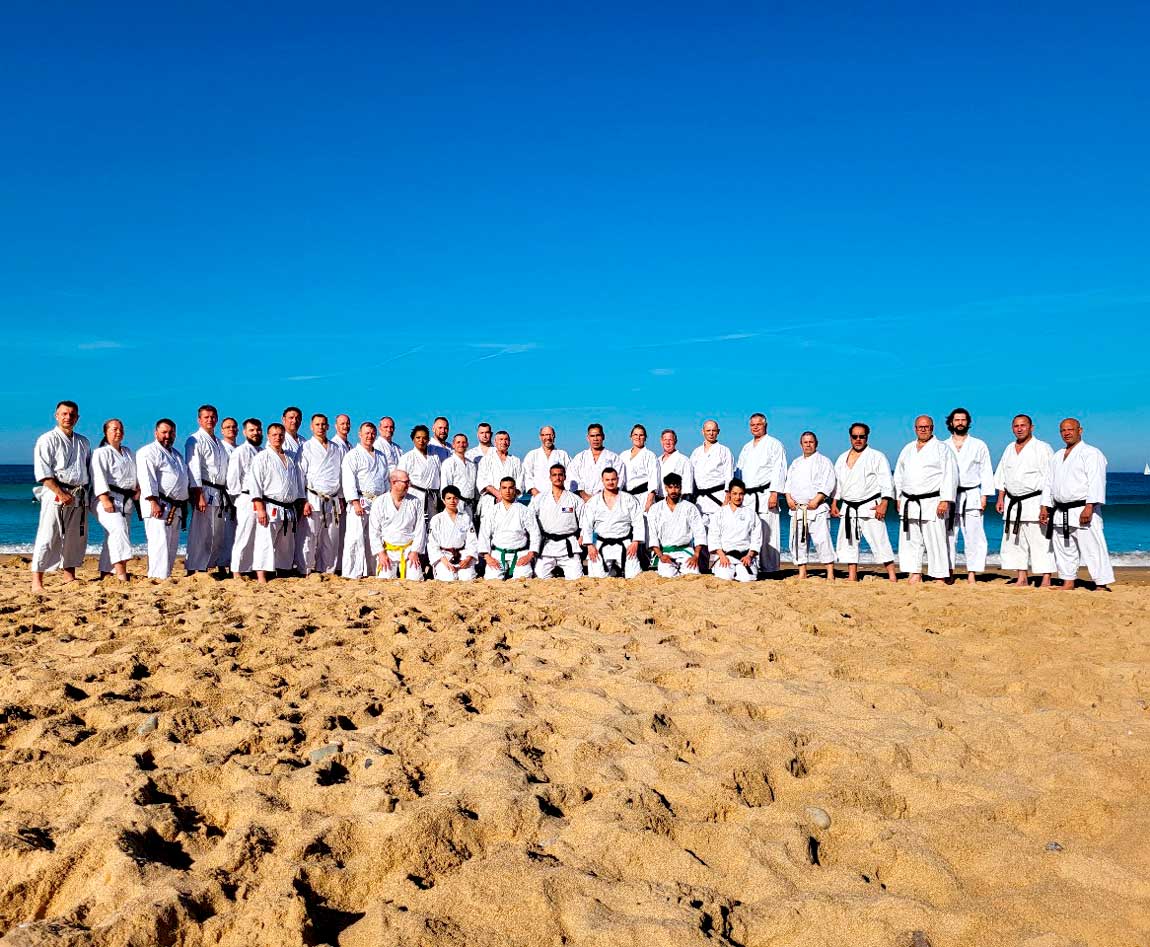 Training on the beach of Les Sables-d’Olonne © ITKF
Training on the beach of Les Sables-d’Olonne © ITKF
The 31st edition of the Master Course held in the city of Les Sables-d’Olonne, France, was a great success and culminated in the final stage of setting up the new grading examination program of International Traditional Karate Federation (ITKF).
Promoted from May 7 to 12 by the ITKF, in partnership with the French Traditional Budô Karate Federation, ITKF Europe, and with the support of the Les Sables-d’Olonne Sports Department, the event provided excellent infrastructure and brought together 55 instructors from 12 countries. Six days of highly diversified activities included theoretical classes on the scientific basis of traditional karate, meditation practice and technical classes on kihon, kumite, kata, and self-defense.
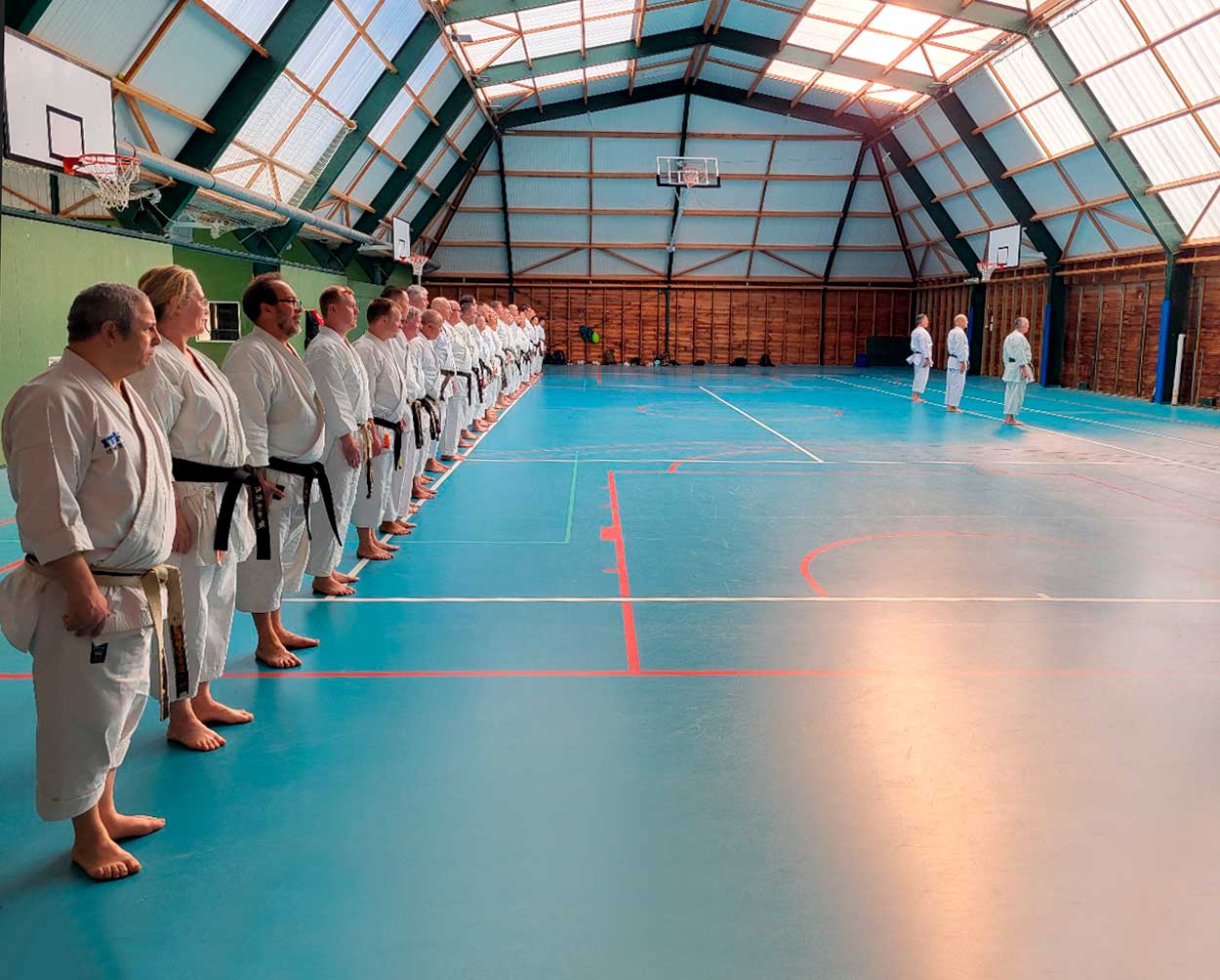
Initial greeting to start the practical classes © ITKF
The opening ceremony of the Master Course 2024 was attended by Gérard Hetch, Secretary of Sports of Les Sables-d’Olonne, who in his speech highlighted the city’s vocation for hosting sporting events and invited ITKF to hold the next editions of the Master Course there, with full support from his department.
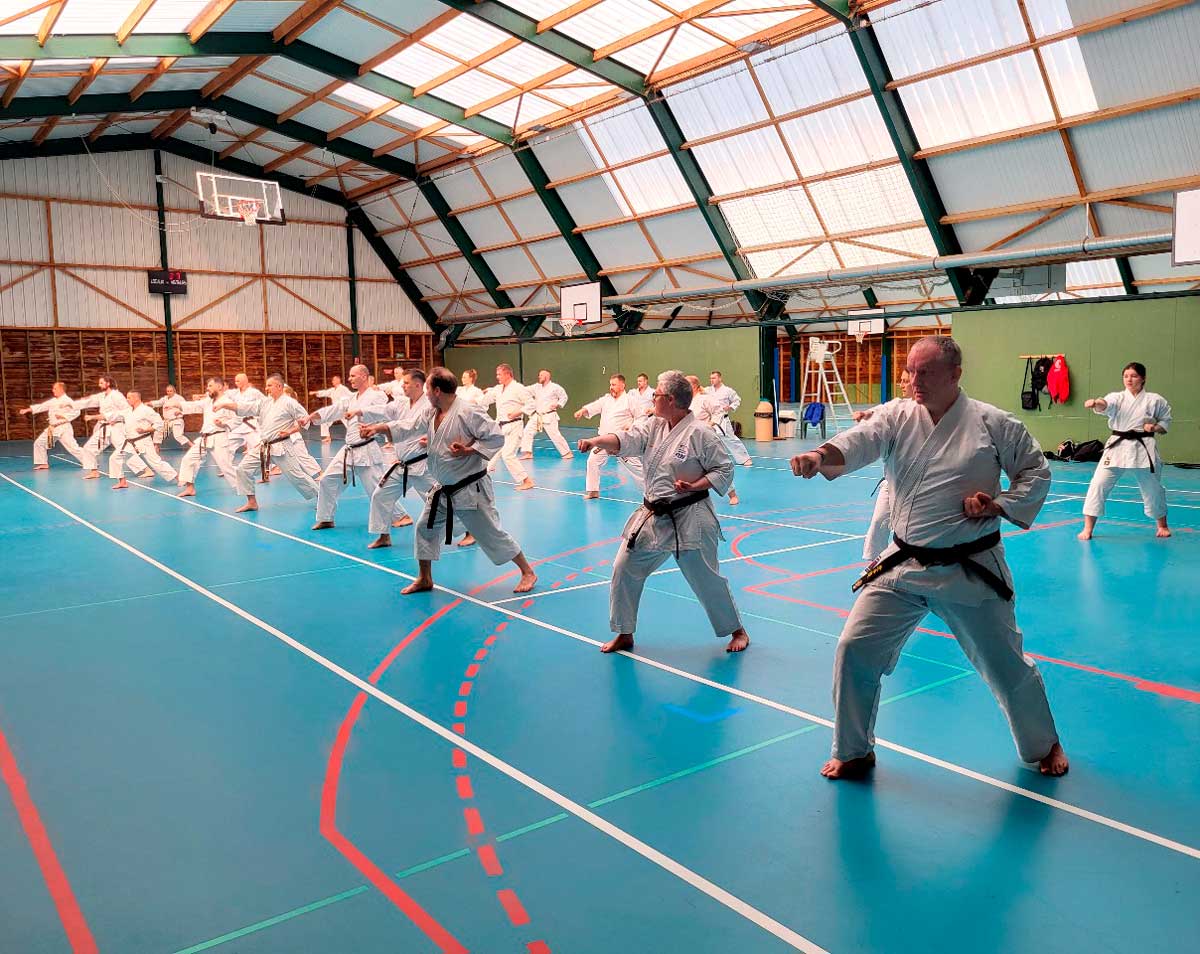
Technical class © ITKF
The opening ceremony was also attended by Gilberto Gaertner, ITKF chairman and member of the Technical Committee of the entity; Sandrine Le Corre-El Marhomy, representative of the French Traditional Budô Karate Federation; Roman Pavlovic, president of ITKF Europe and event organizer; Eligio Contarelli and Justo Gómez, members of the ITKF Technical Committee; Drª. Laura Simsolo, president of the French federation and Fernando Silva, vice-president of ITKF Europe, president of the Portuguese Karate Federation, and chairman of the organizing committee for the ITKF World Championship to be held in October.
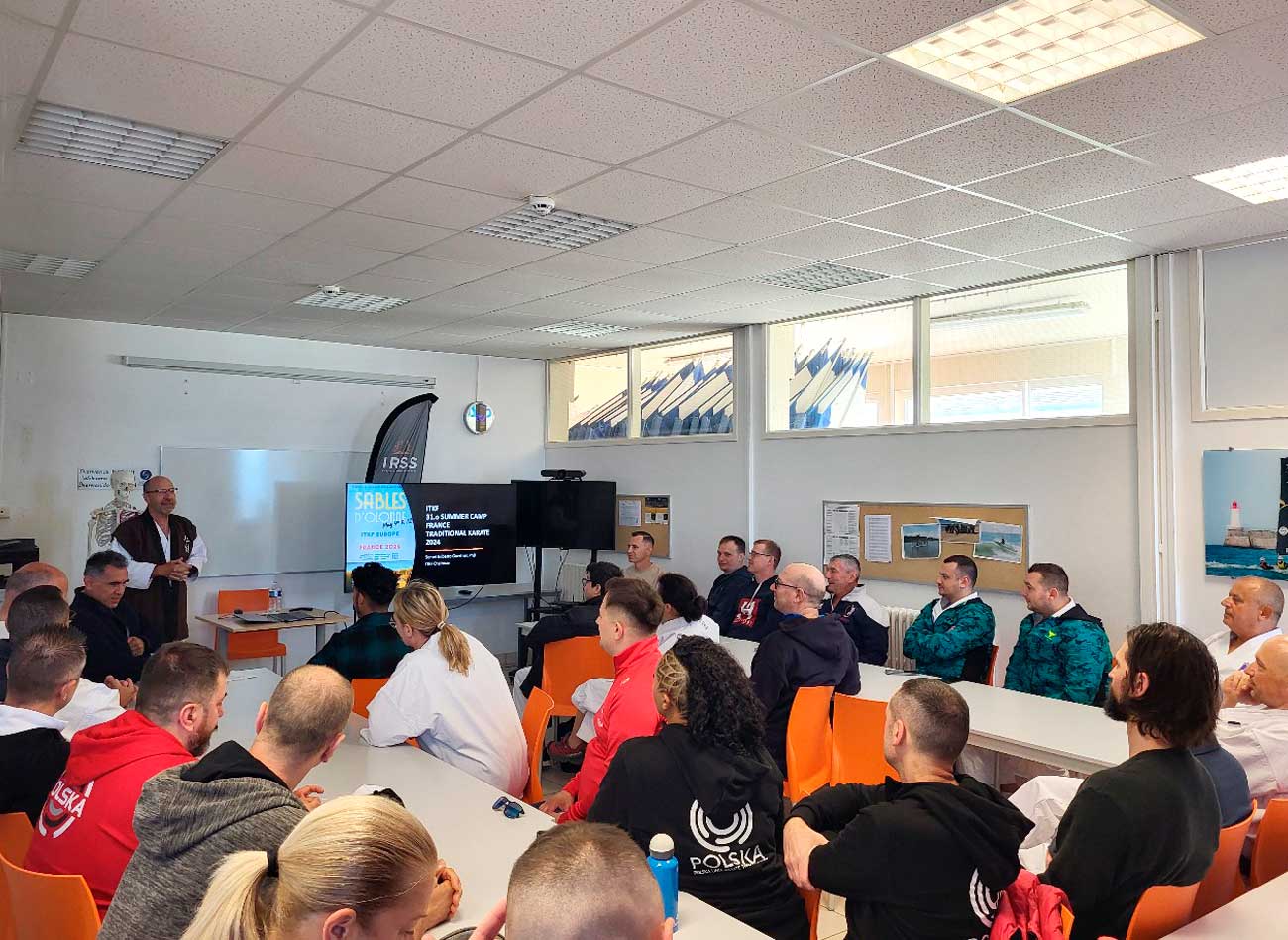
Theoretical class © ITKF
Participants were accommodated at the Institute of Ocean Sports, where theoretical classes were held, while practical classes took place in the excellent gym of the local tennis club, just steps from the hotel.
In total, the event hosted 55 representatives from 13 countries: England, Czech Republic, Italy, Poland, Algeria, Argentina, Egypt, Slovenia, United States, Brazil, Romania, Portugal and France.
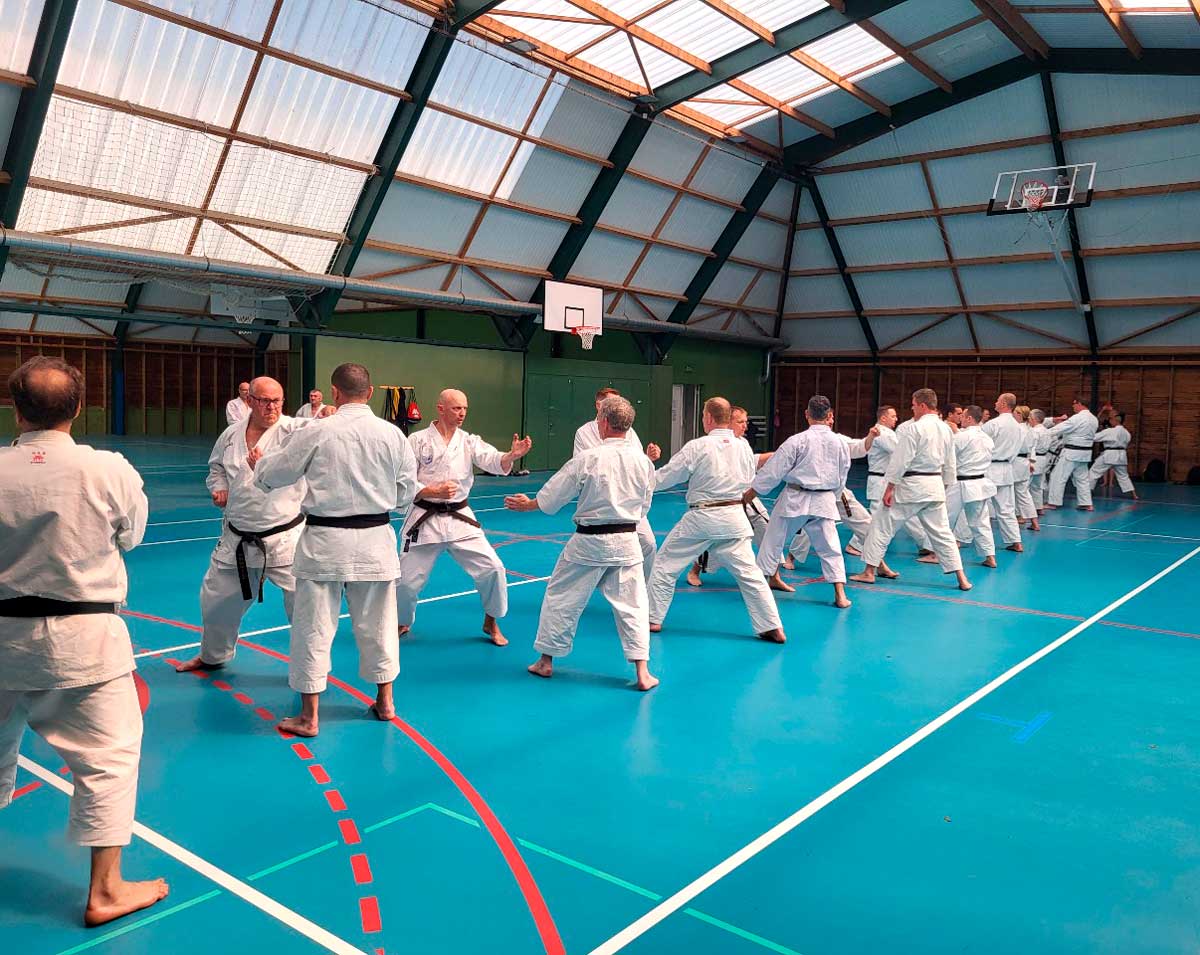
Kumite training © ITKF
Classes were taught by the renowned ITKF Technical Committee, consisting of sensei’s Eligio Contarelli (Italy), Justo Gómez (Argentina) and Gilberto Gaertner (Brazil). These masters, globally recognized for their expertise and contributions to ITKF Global, provided an exceptional level of knowledge and skill to the Master Course.
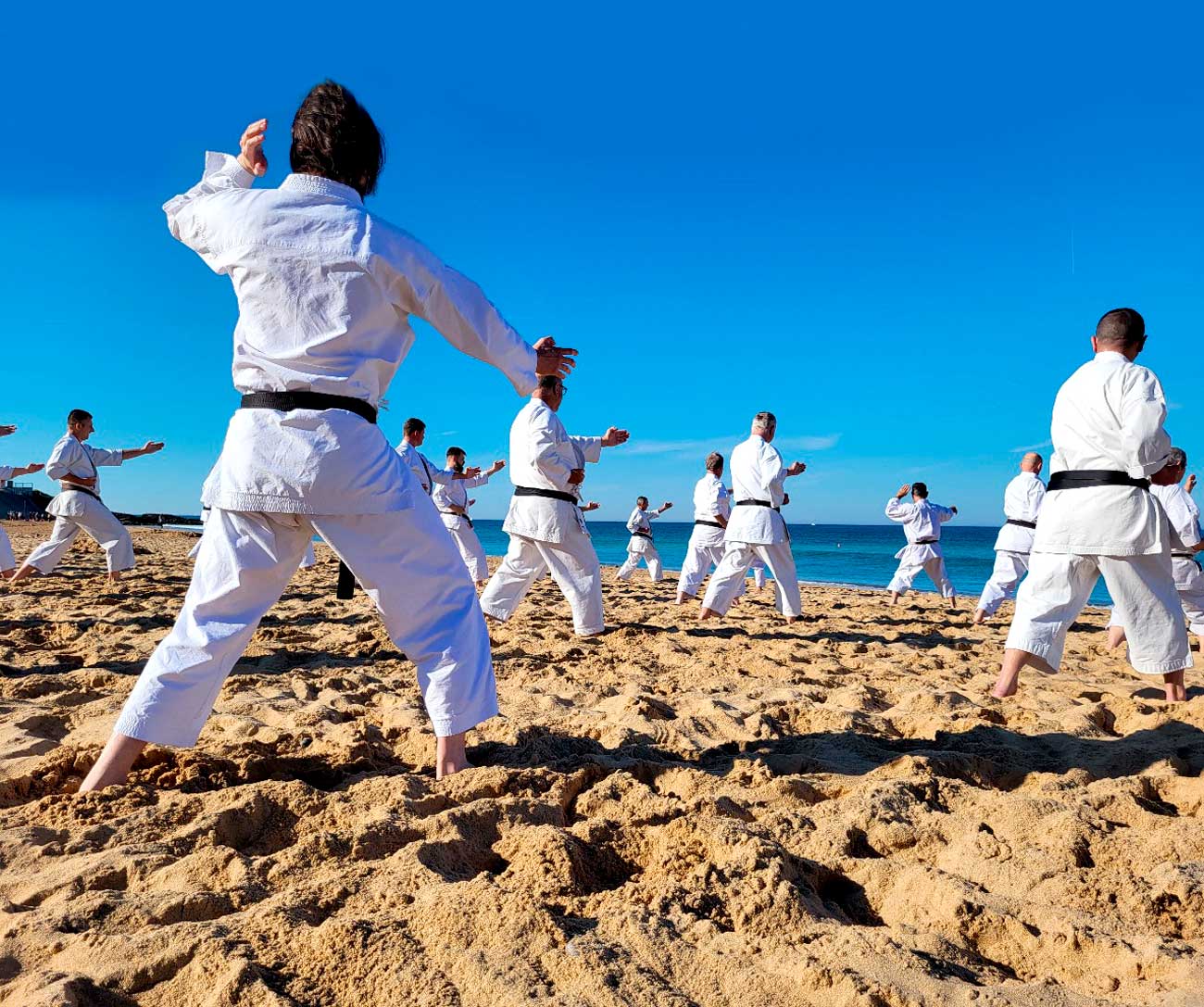
Training on the beach © ITKF
The Technical Committee identified the event as an exceptional opportunity to finalize the last details and deliver the final phase of the new grading exam program for sho-dans and ni-dans. According to the committee members, the high degree of demand and complexity of the new program will not only challenge practitioners but also significantly elevate the technical level of ITKF globally, both in the medium and long term. This innovation is seen as an important milestone for the future of traditional karate, promoting continuous and in-depth development of its practitioners.
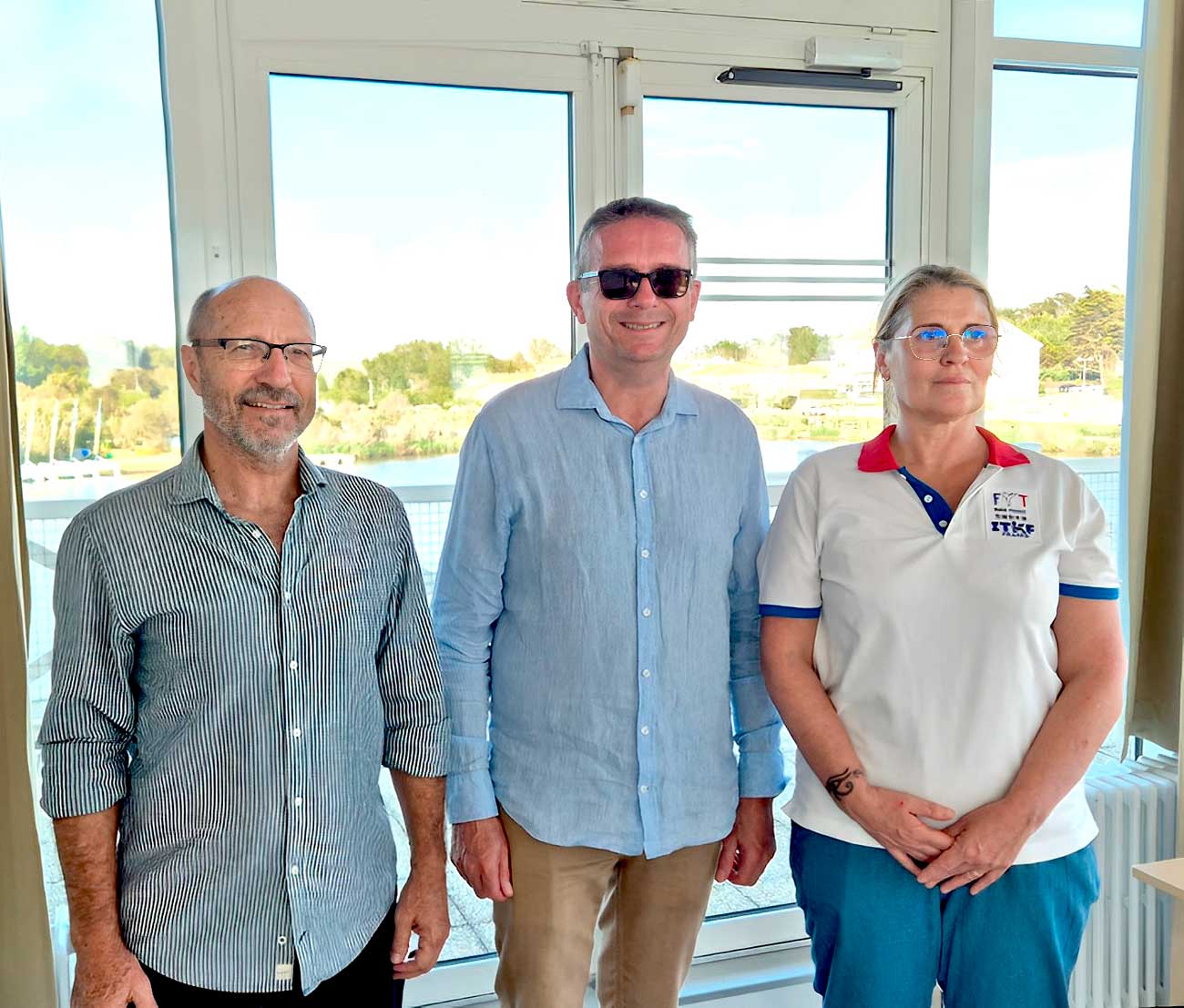
Gilberto Gaertner, Gérard Hetch, and Sandrine Le Corre-El Marhomy © ITKF
According to sensei Annia Kulczynska from Poland, the experience gained during the six days of the event marks a milestone in the technical improvement of ITKF on a global level.
“We left the Master Course with many ideas to improve training and enhance the technical development of traditional karate. Thanks to this trip, we realized where we are in our karate-dô training life, where we would like to be, and where we strive to be. We are grateful for the teachings received in such a beautiful place in France as Les Sables-d’Olonne. It was an unforgettable experience and now we will transmit everything we learned here to the karatekas in our country.”
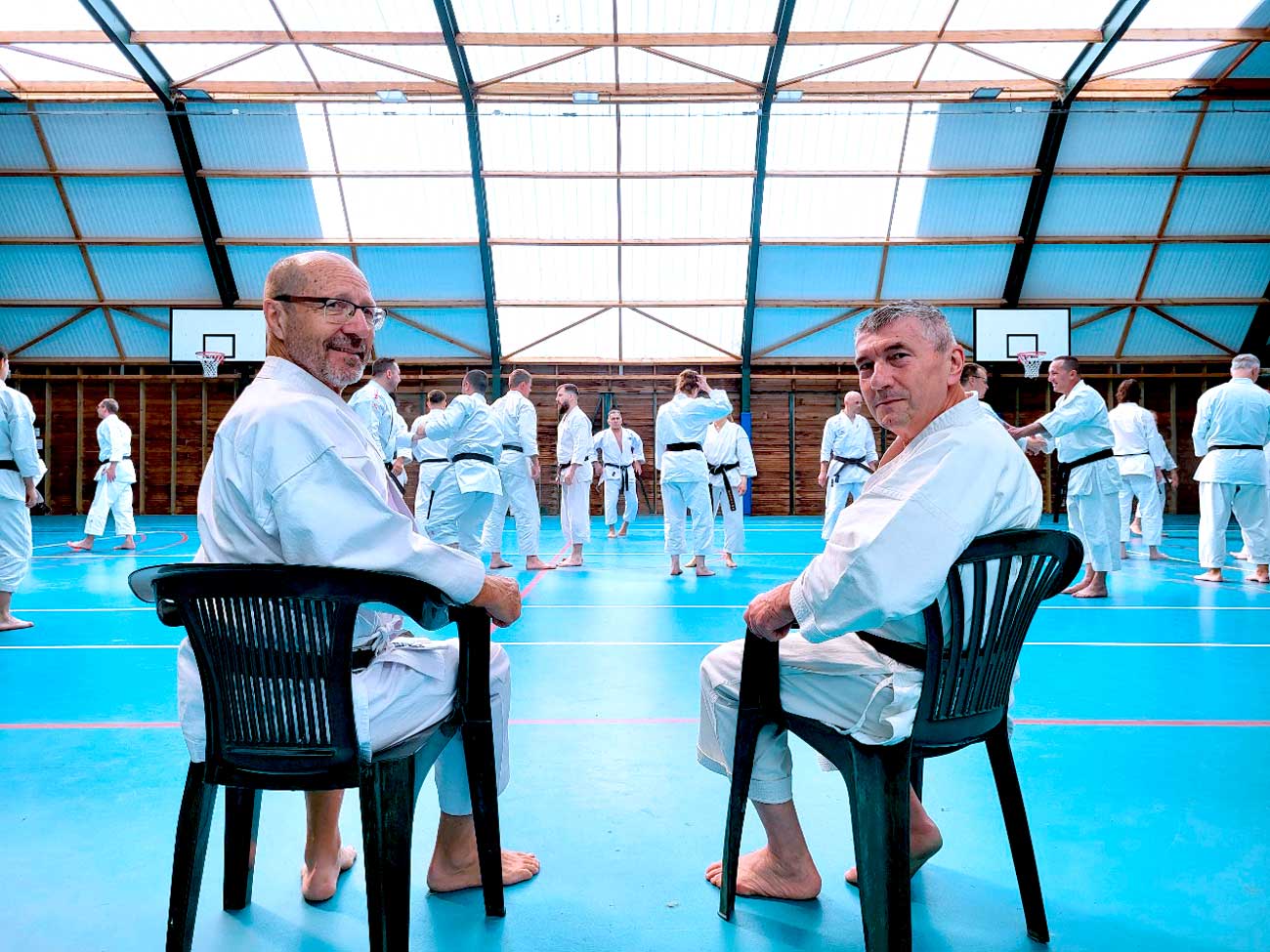
Gilberto Gaertner and Eligio Contarelli oversee the technical training © ITKF
For sensei Eligio Contarelli, member of the ITKF Technical Committee, the new ITKF grading examination program is an important pedagogical tool for the technical improvement of black belts.
“During the Master Course in France, the main characteristics of kihon for the promotion to sho-dan (1st dan) and ni-dan (2nd dan) were presented. After a thorough evaluation, the proposal was accepted by the Technical Committee and the ITKF Global board. The program was adopted with great interest, both for the variety of techniques and the objectives set for the practitioner’s technical development, provided it is practiced assiduously. Therefore, it proposes an innovation not only by the change in grading but above all by its didactic and educational value.”
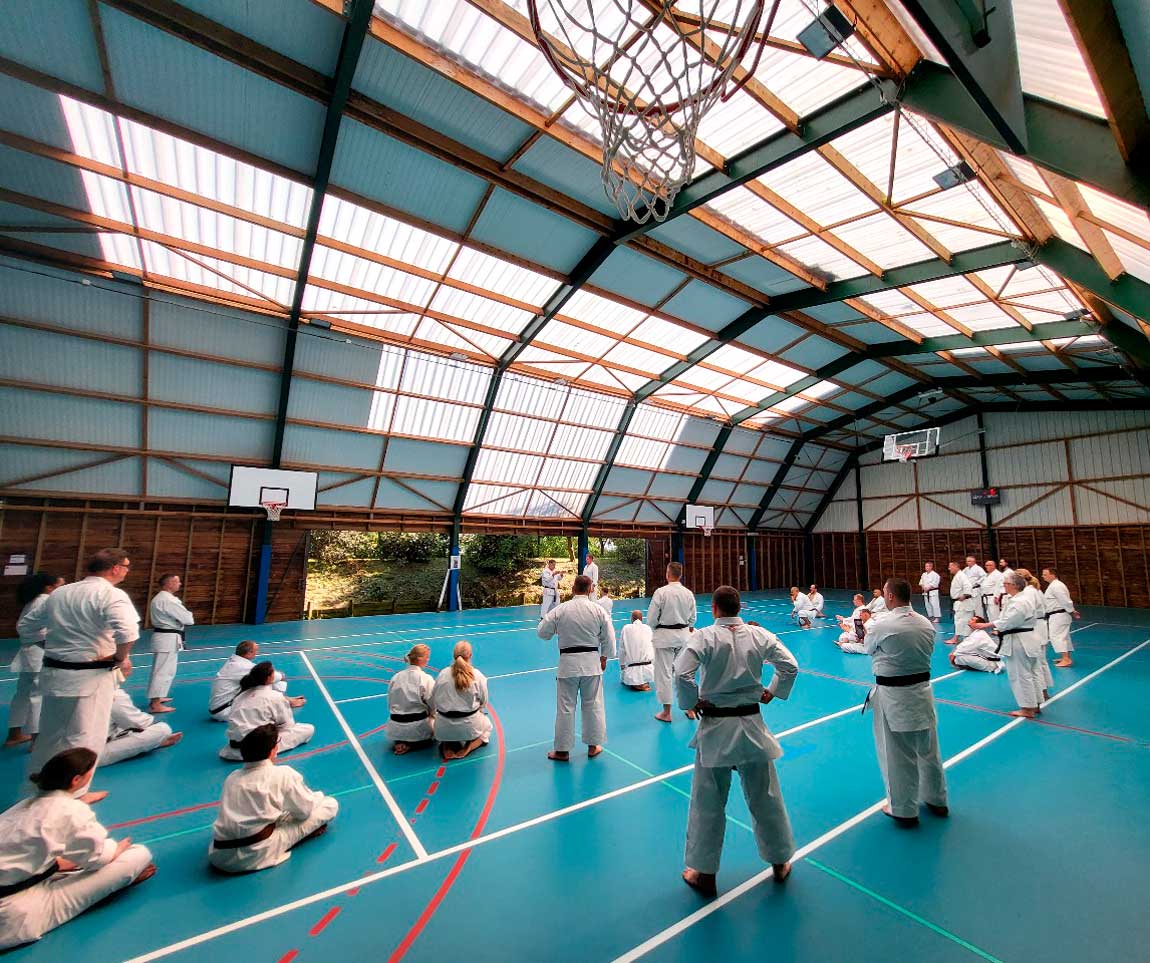
Technical class © ITKF
Eligio Contarelli concluded by detailing the pedagogical aspect of the new program. “The didactic value refers to its effectiveness as a teaching tool, providing a clear and comprehensible structure for the practice of karate. The educational value stands out for promoting the integral development of the practitioner, not only in terms of technical skills but also in aspects such as discipline, concentration and personal growth, qualifying it as an important teaching tool for karate.”
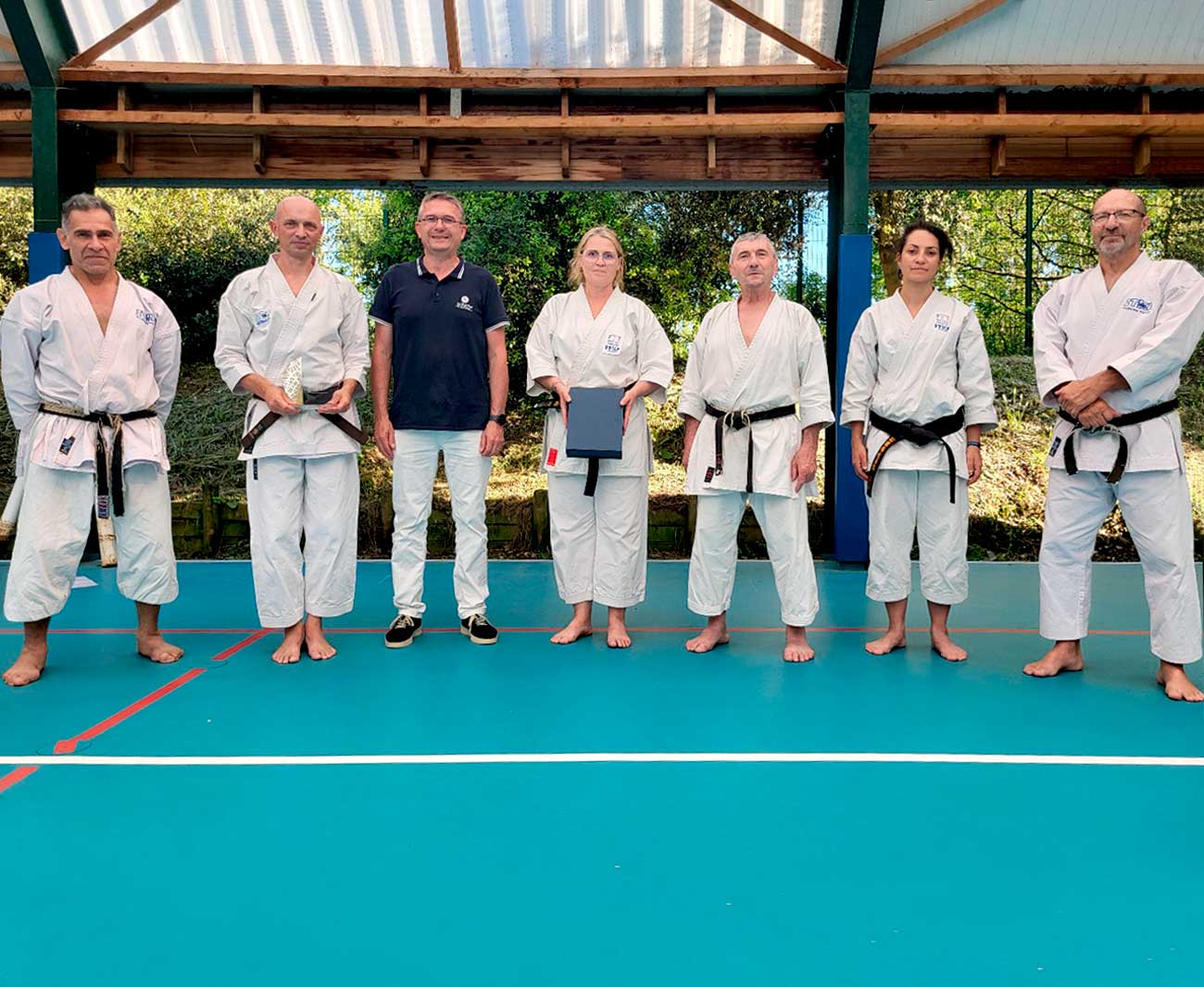
Senseis Gomez, Roman, Sandrine, Contarelli, Laura and Gaertner with Gérard Hetch © ITKF
Sensei Justo Gomez also emphasized the pedagogical aspect in the kumite evaluation, which, besides the fight itself, brings all the fundamentals of traditional karate developed by Master Nishiyama, especially the application of Oji-Waza.
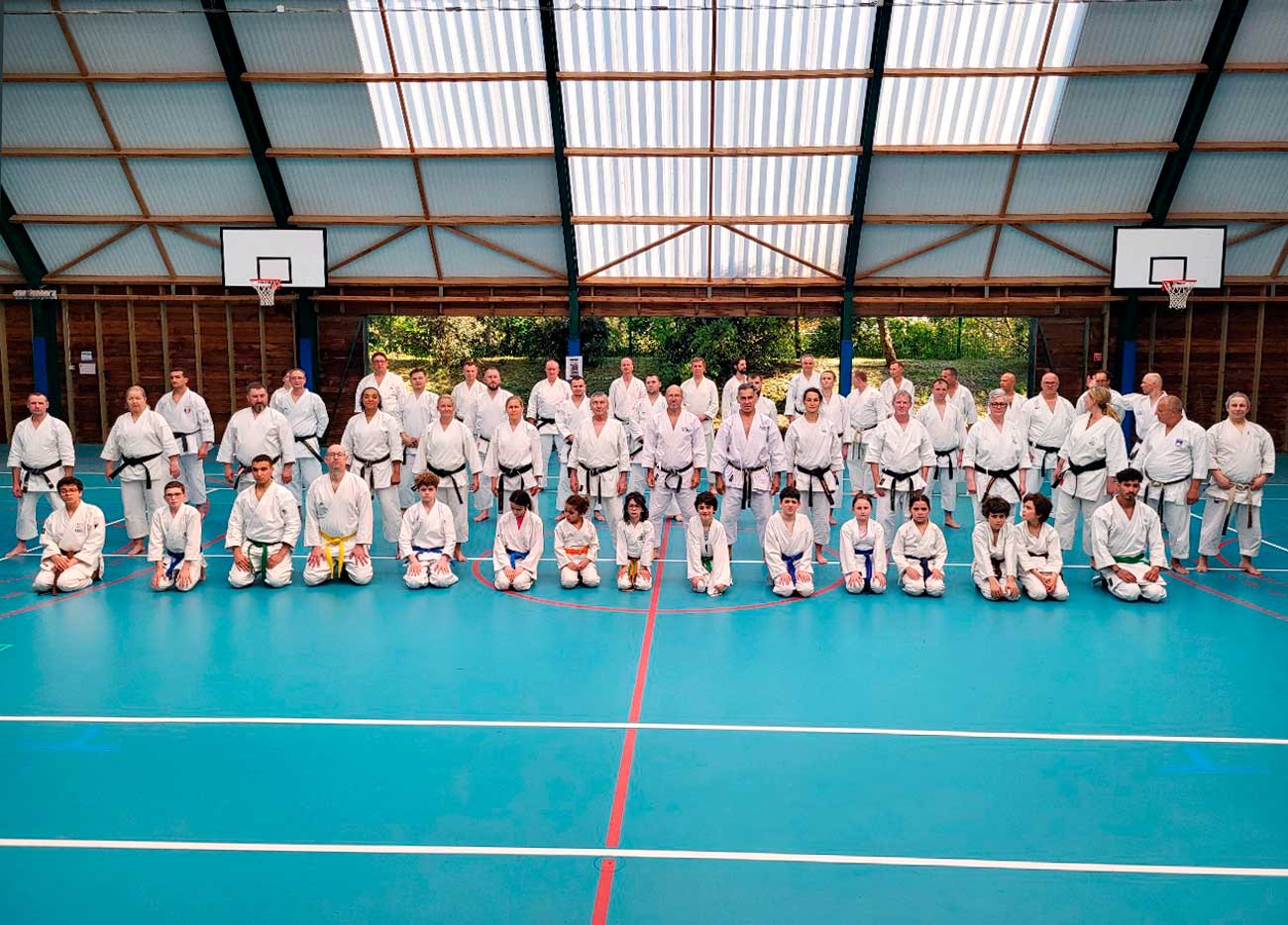
Training opening © ITKF
Sensei Gaertner reinforced that the new ITKF grading program undoubtedly constitutes an evolution in the training of kihon, kata, kumite and self-defense, within a gradual evolution of complexity with a pedagogical focus. He exemplifies with the content of the 1st Dan (shodan) black belt exam, in which the candidate performs a kihon with 6 sequences of renzoku-waza (integrated techniques of attack, defense, and counterattack). In the kata part, they can choose between 3 katas (Bassai-Dai, Jion, or Kanku-Dai) and must present the Heian Waza followed by the self-defense technique set Shuto Waza. In kumite, they start with the application of todome with arm and leg techniques, followed by Oji Waza applying Go-No-Sen and Uke-Waza, followed by Jyu-Ippon-Kumite and Jyu Kumite.
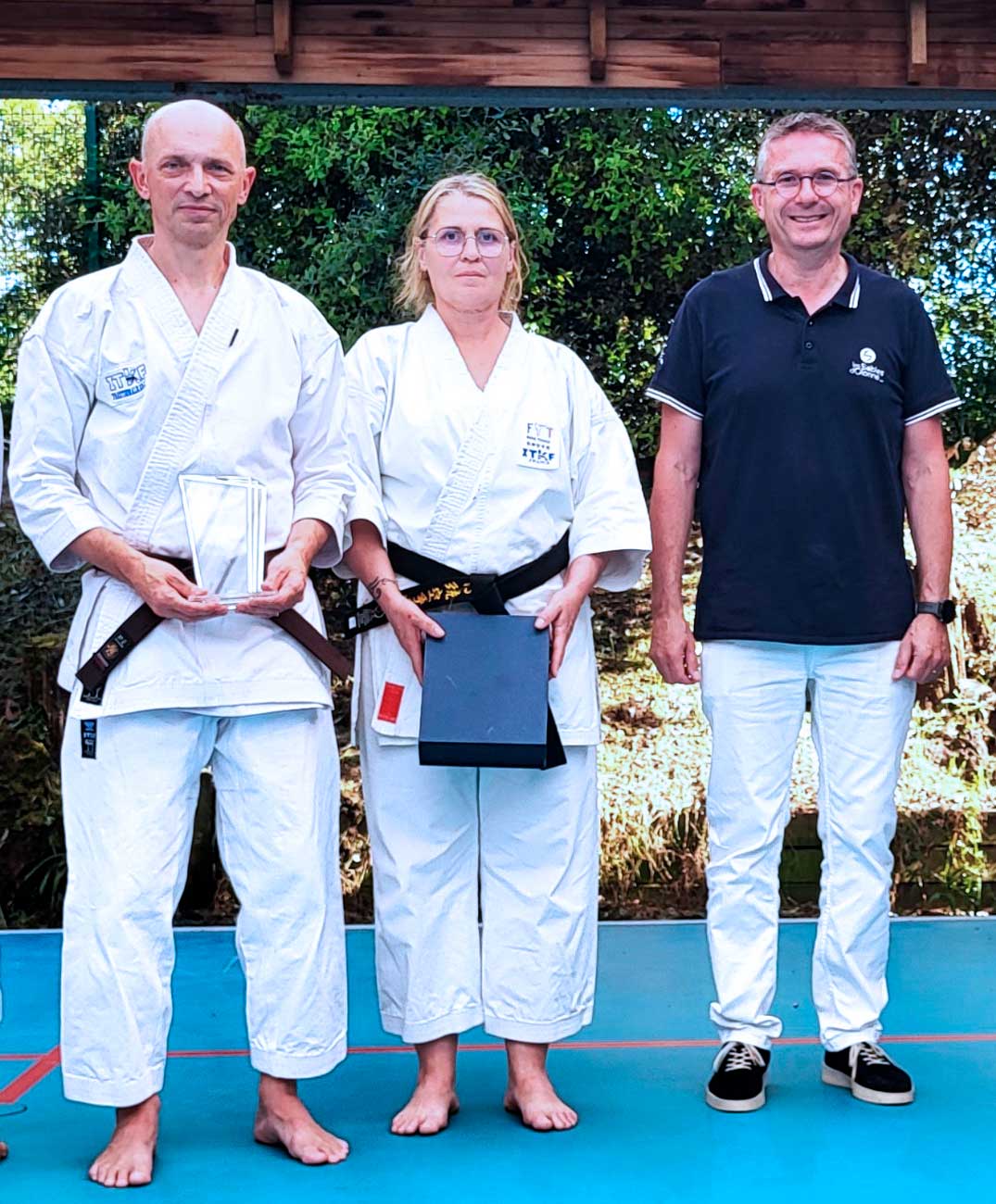
Roman Pavlovic, Sandrine Le Corre-El Marhomy, and Gérard Hetch © ITKF
ITKF chairman Gilberto Gaertner highlighted the excellent organization of the event, held in a very beautiful location, the proximity between accommodation and training venue, the presence of 55 participants in the course and the quality of the classes taught.
“I thank all the black belts who came to France to experience the first ITKF technical event of this season. On behalf of sensei Sandrine Le Corre-El Marhomy, I thank very much the work, dedication and effort of the entire team of the French Traditional Budô Karate Federation and the local organizing committee, as well as the ITKF Technical Committee.”

Panoramic view of the Institute of Oceanic Sports © ITKF
Gaertner recalled that the Master Course 2024 precedes this year’s World Championship, when the practical results of the changes made in Les Sables-d’Olonne will be perceived. “In October, we will hold the largest edition of the ITKF World Championship in Vila do Conde, Portugal. For the first time, we will simultaneously hold another Master Course in which the changes implemented in France will be consolidated and the result of this initiative will certainly be noticed in the event.”
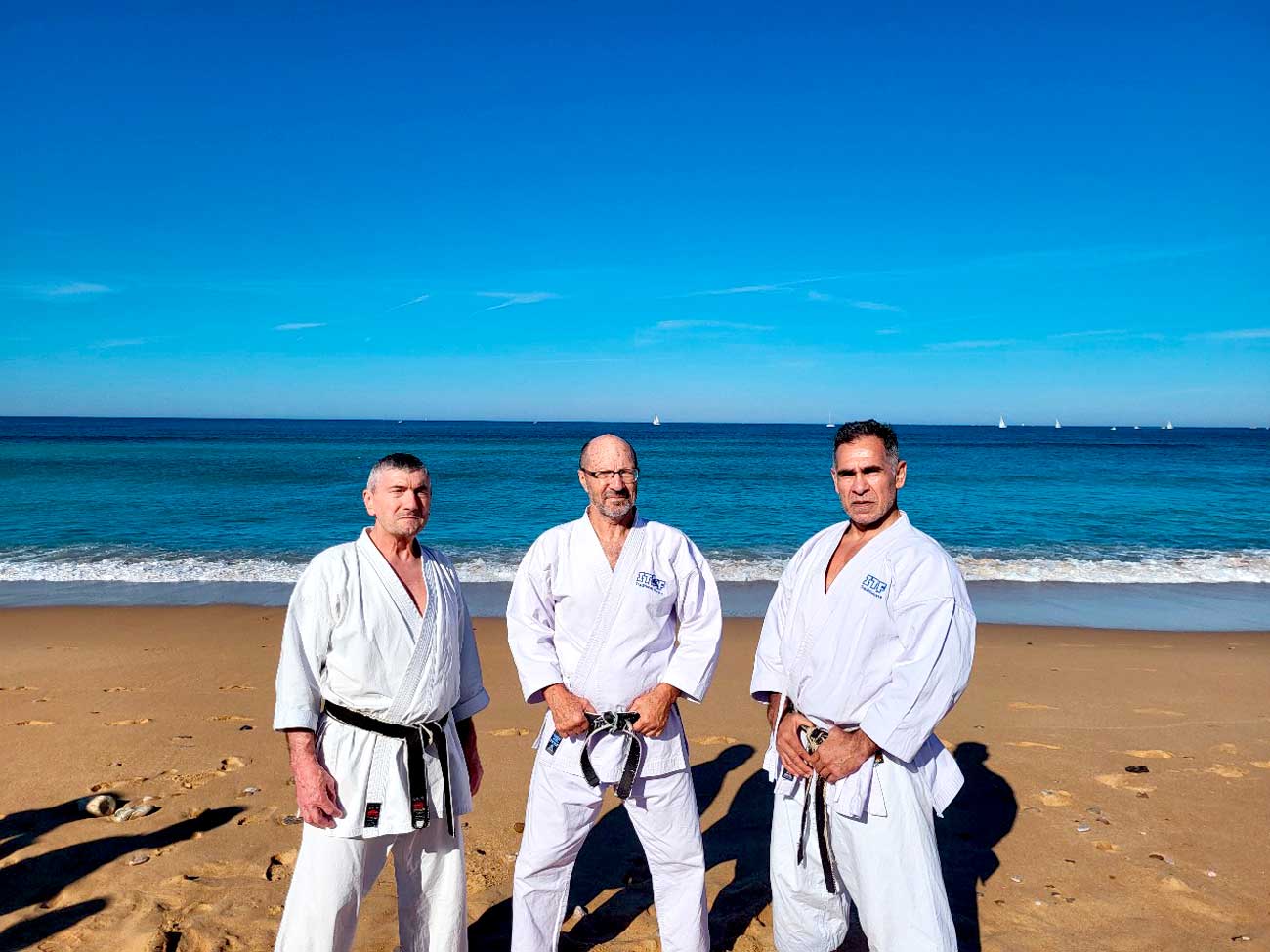
Eligio Contarelli, Gilberto Gaertner, and Justo Gómez, members of the ITKF Technical Committee © ITKF
Gaertner also congratulated Slovenian sensei Roman Pavlovic, chairman of ITKF Europe and member of the event organization, for the exceptional quality of the 31st edition of the Master Course in France. “Pavlovic’s dedication and effort were fundamental to the success of the event, reflecting in the impeccable organization and high technical level of the activities developed,” said Gaertner.
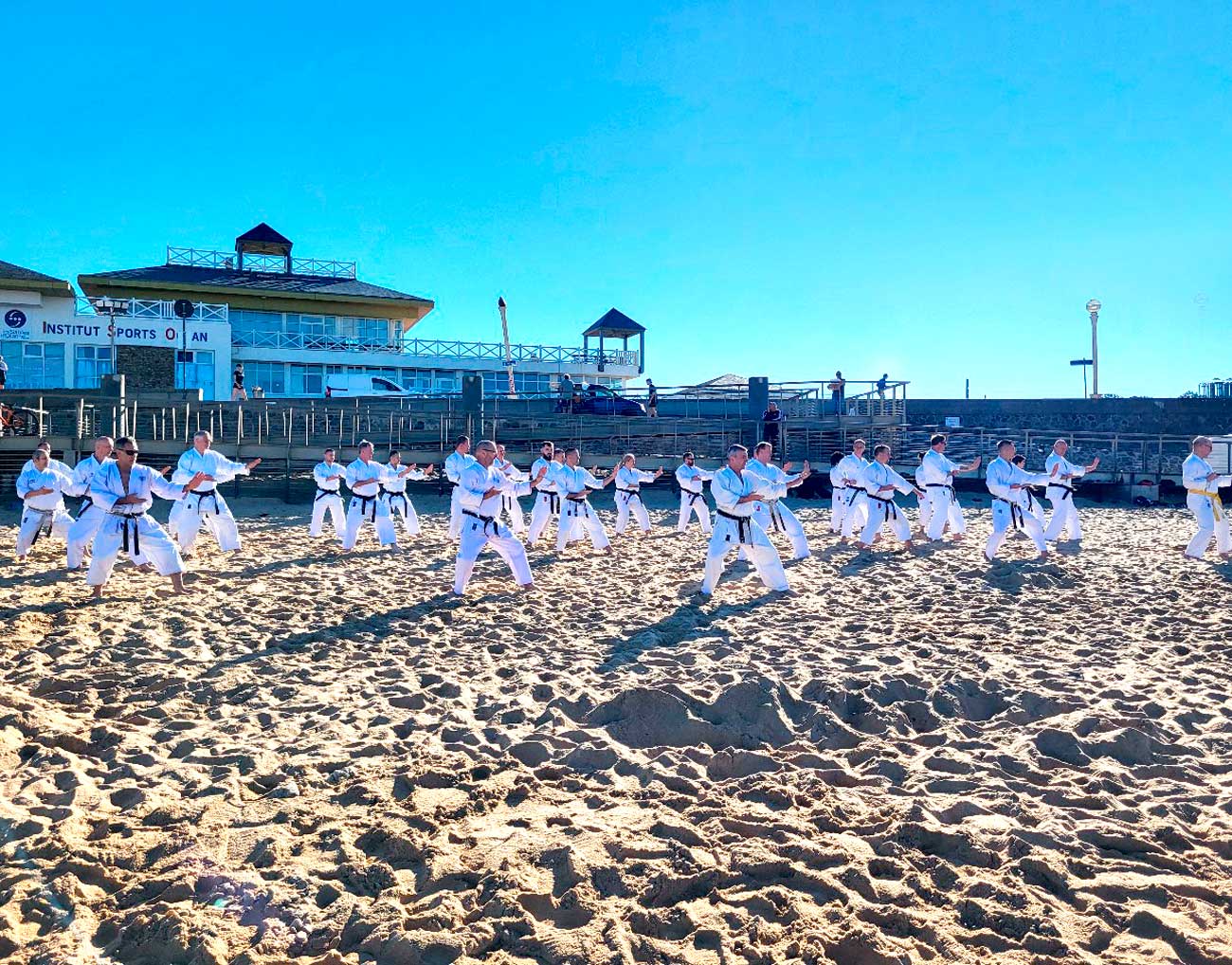
Training on the beach © ITKF
Roman Pavlovic assesses that over the years, the Master Course in France has become the greatest technical reference for ITKF Europe members. “It is fundamental in the transfer of knowledge to our trainers, examiners and referees. Moreover, it functions as a significant harmonization event, where we meet our karate friends, both during and outside training sessions, strengthening our bonds and creating new projects for future cooperation.”
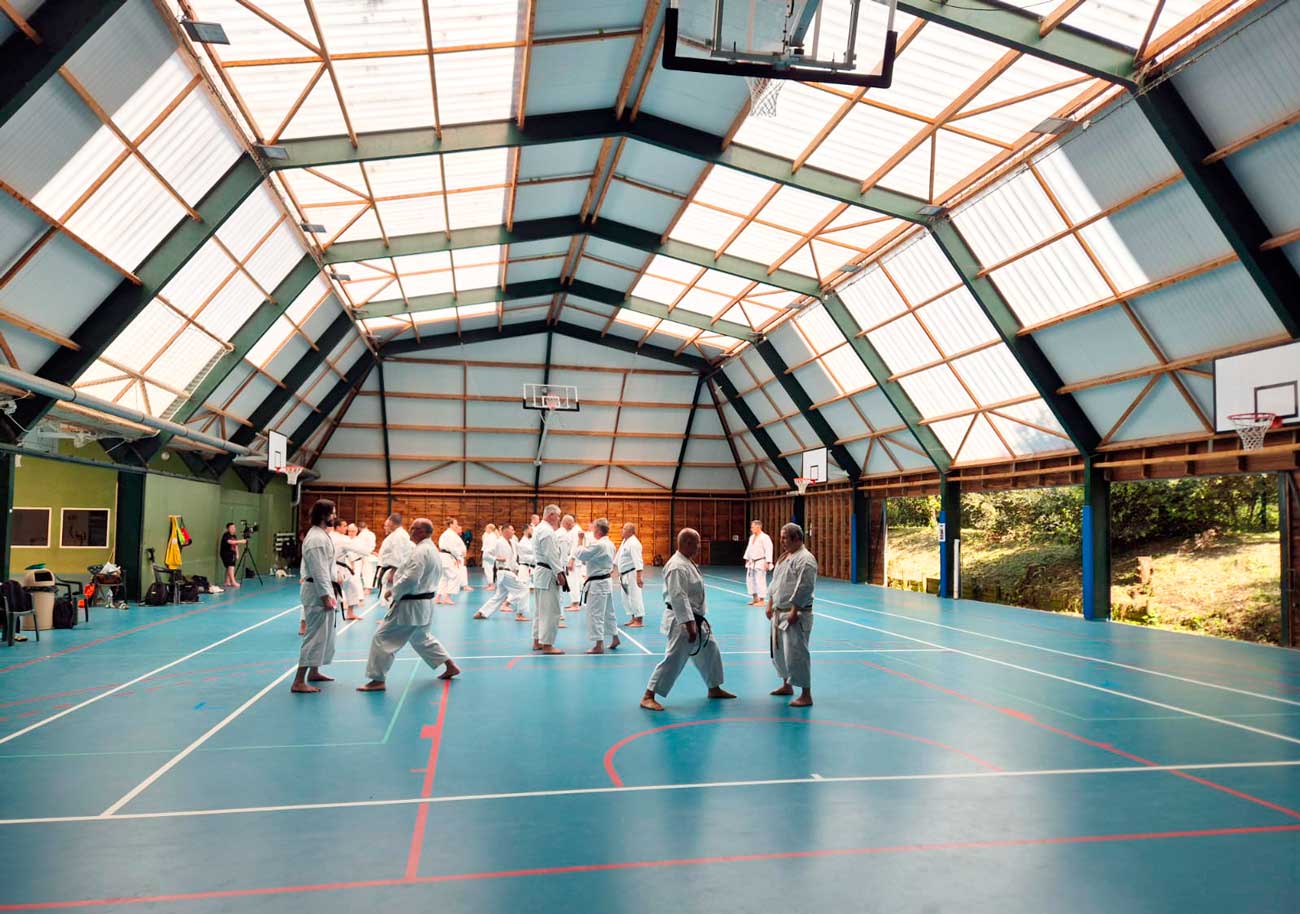
General view of the tennis club gym © ITKF
In this edition, specifically, Pavlovic says the French Traditional Karate Federation stood out by providing excellent accommodation, location, and training facilities. “ITKF Technical Committee members elevated our understanding of the principles of traditional karate, which were integrated into the new ITKF grading examination program. The intense four-day training, consisting of five hours of daily theory and practice, offered us the opportunity to incorporate new knowledge into our practice and learn methodologies to transfer this knowledge to the members of our national federations.”
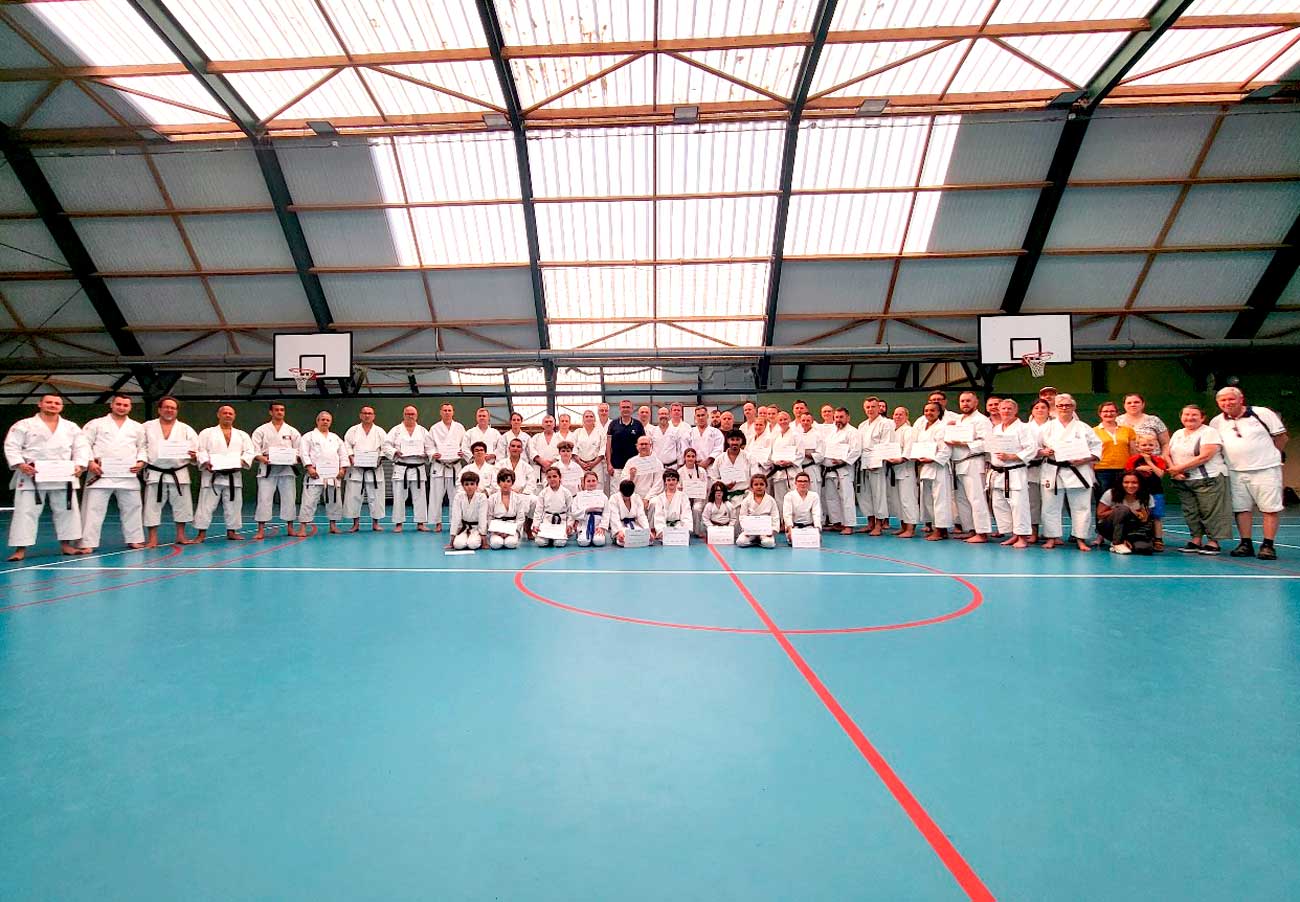
Training closing © ITKF
Pavlovic concluded his assessment by noting that the new ITKF DAN examination program provides practitioners with a systematic approach to evolve, integrating traditional karate principles into their practices. “The new sections of kihon, kata, and kumite in the examination program are harmoniously designed to emphasize the key requirements of each grading level. Thus, it functions not only as an examination program but also as an excellent teaching tool. I believe many ITKF members will soon understand this new format and integrate it into their teaching and examination programs.”
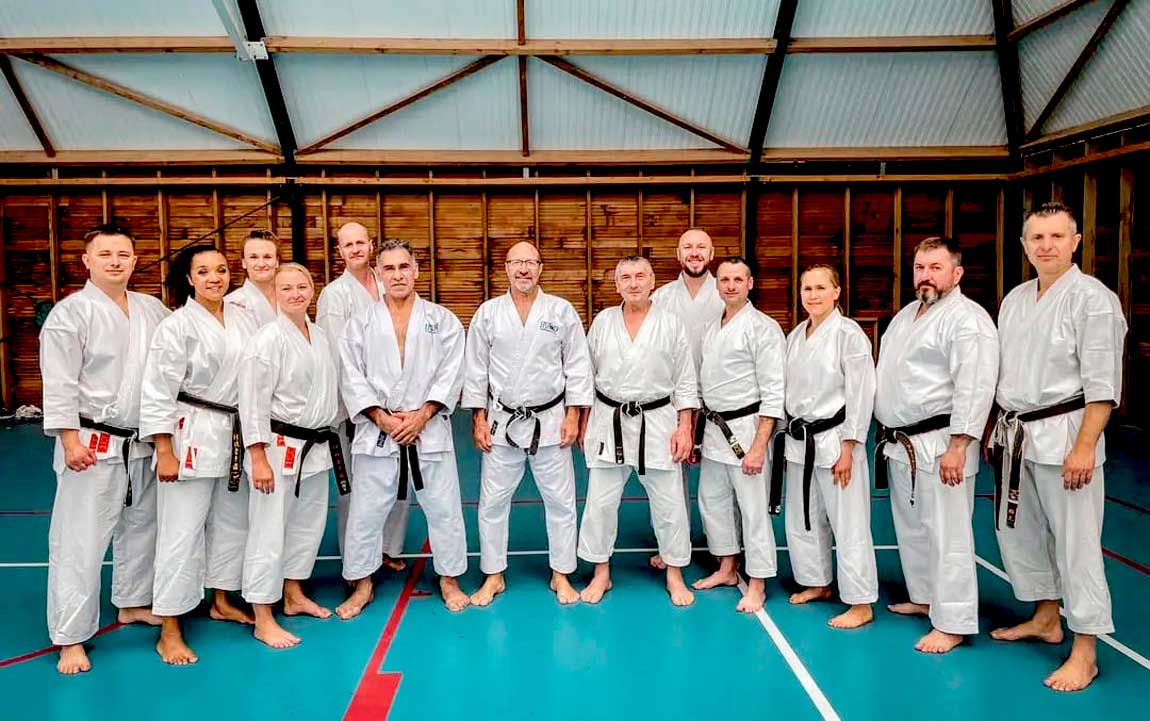
Members of the ITKF Technical Committee with sensei Annia Kulczynska and the Polish team © ITKF
Making his overall assessment of the 2024 France Master Course from a technical and structural perspective, Fernando Silva believes the meeting was of very high level, merging the technical and structural knowledge of ITKF Global.
“The traditional technical event brought together practitioners from various backgrounds, eager to absorb the new knowledge that our prestigious ITKF always provides and shares with its affiliates. The content presented was of such importance that the time dedicated during the four days seemed to fly by and pass quickly.”
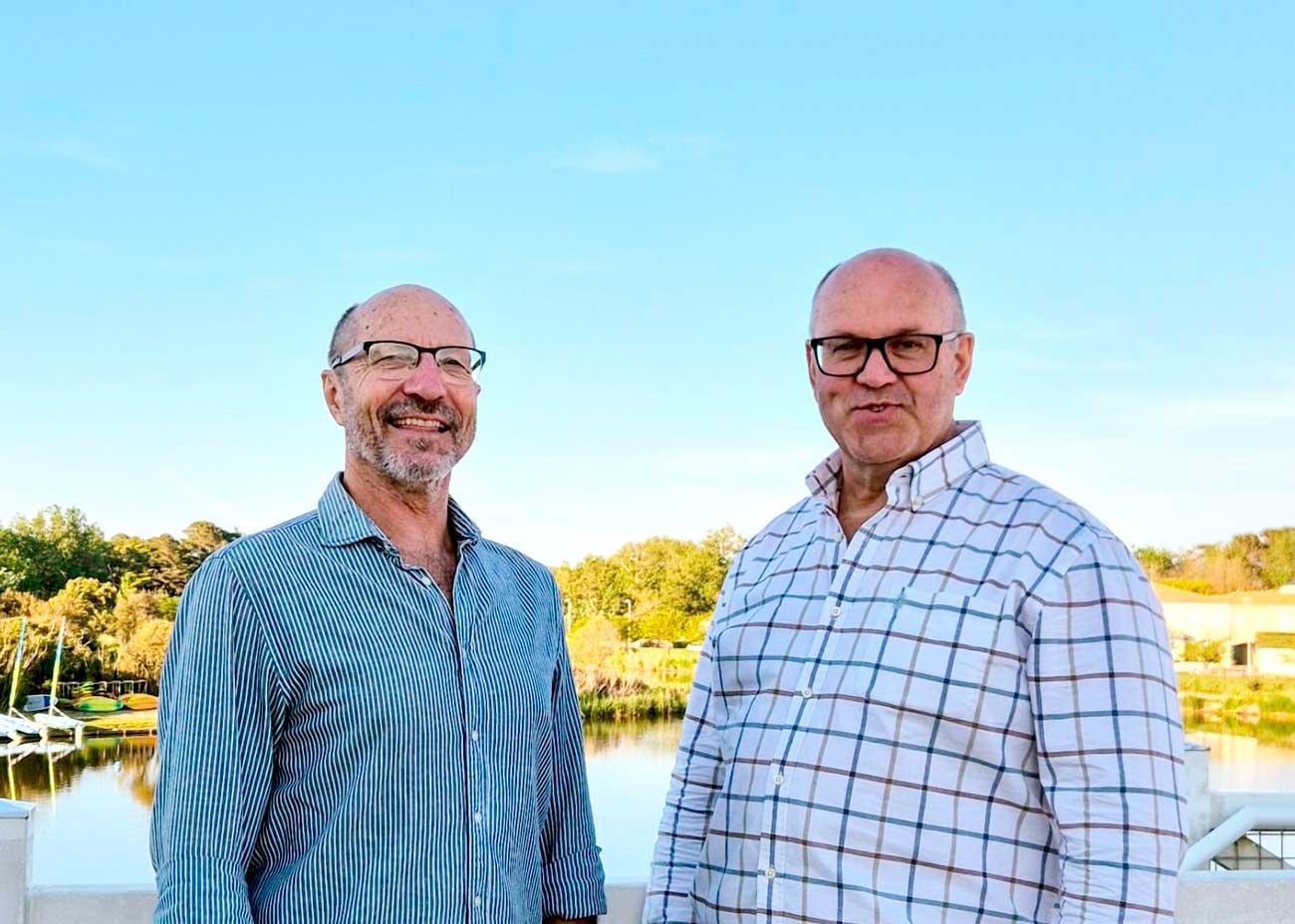
Gilberto Gaertner, ITKF chairman, and Fernando Silva, ITKF Europe vice-president © ITKF
The president of the Portuguese Traditional Karate Federation detailed the daily routine of the meeting: “From the meditation training on the beach at 7:00 AM to awaken minds and gather energy from the universe, through the new kihon training and its real-life applicability, which will now be part of ITKF Global graduations, to the study and practice of kata in its purest form, it was a breath of fresh air for all traditional karate lovers.”
Vice-president of ITKF Europe, Silva, noted that for referees, the meeting was of unmatched effectiveness. “Knowing how to correctly analyze precision techniques and their effectiveness in the correct and scoreable locations, as well as specifically evaluating whether the todome-waza, the opponent’s definitive and destructive blow, was significant or not, was revealing. Structurally speaking, I have only one word to say: excellent.”
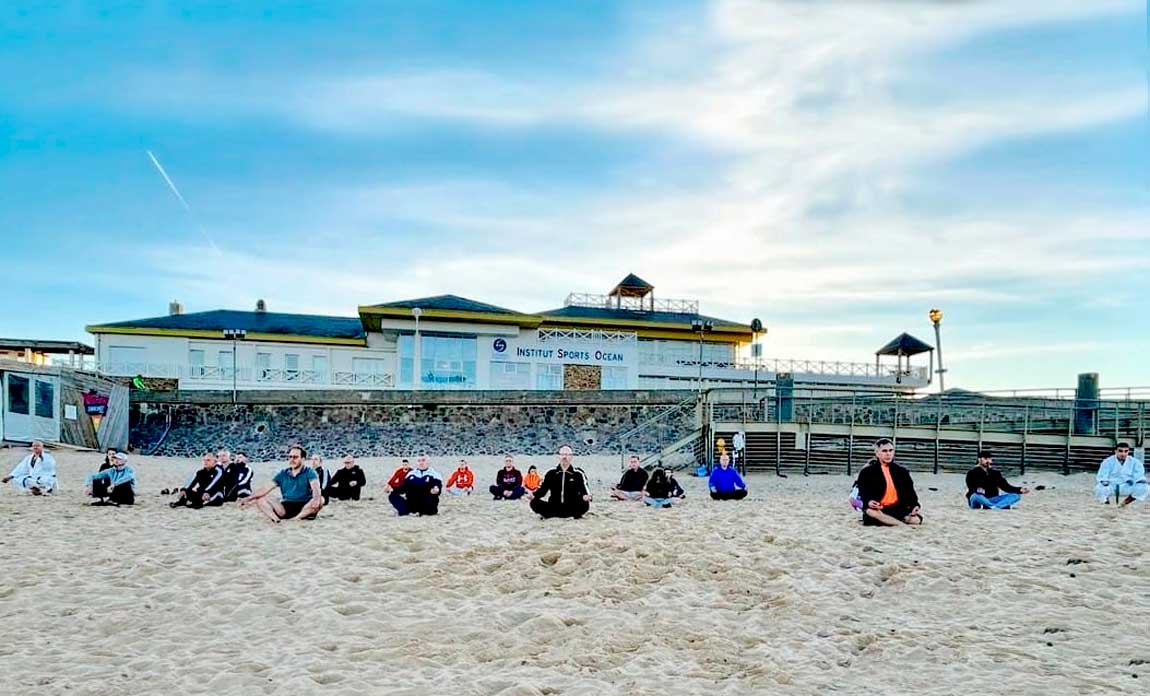
Meditation on the beach of Les Sables-d’Olonne © ITKF
“The meeting provided immense integration among athletes from various regions, solidifying interrelationships and martial friendships, regardless of each participant’s origins,” said the Portuguese leader.
Regarding the implementation of the new ITKF Global examination program and its applicability, Silva assessed that this was an important step in the technical management of the entity. “Without a doubt, this was a very significant milestone for the Federation, which will certainly stand out from everything that exists in karate in this segment,” the leader explained, adding.
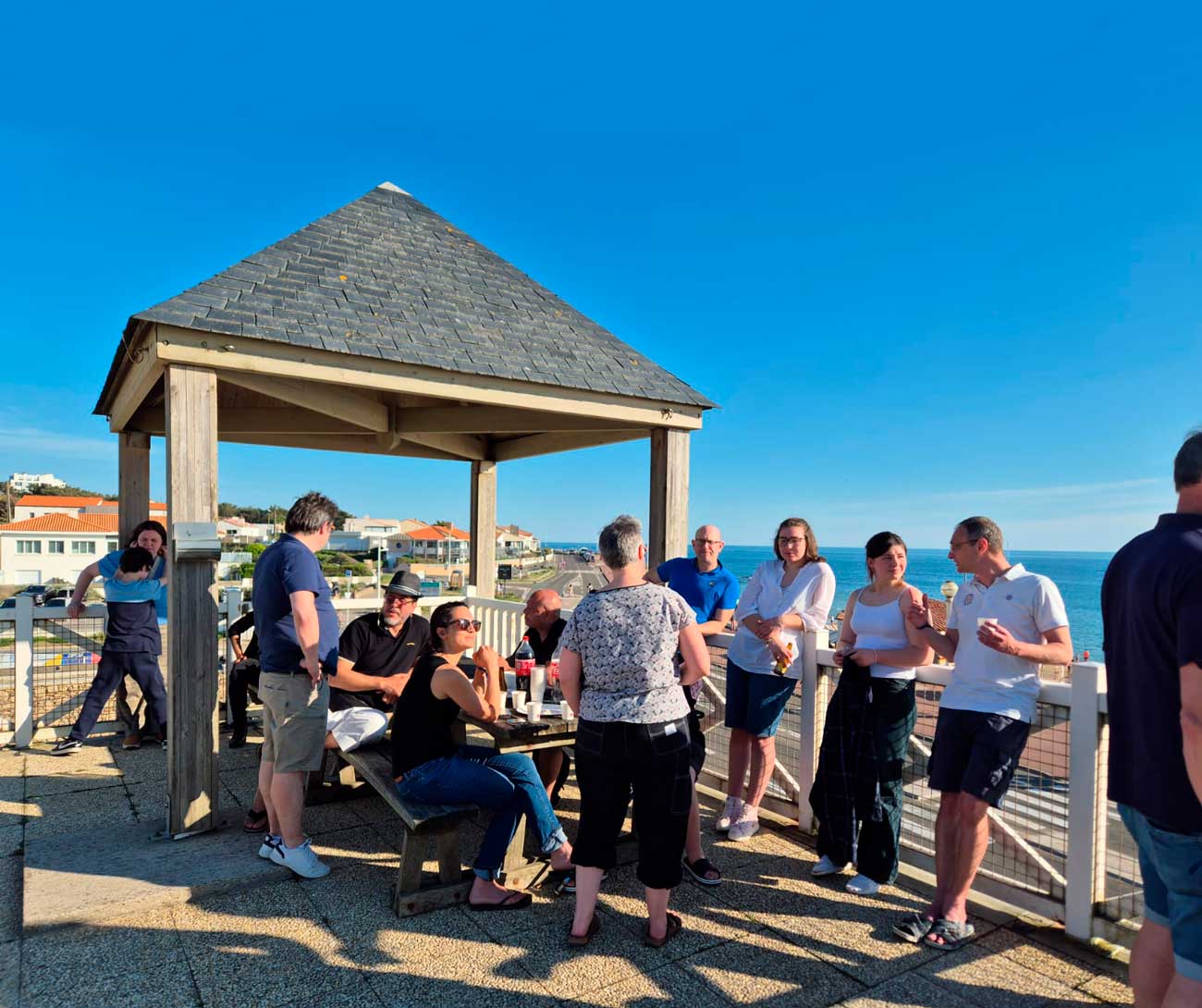
Social gathering © ITKF
Fernando Silva concluded by evaluating the advantages that ITKF’s innovation offers to practitioners: “Its rigor and effectiveness are of utmost importance, as its applicability in a real act is excellent and unparalleled. Those who practice and dedicate themselves will use their body and limbs as a whole, thus developing mental, physical and sensory capacity, better preparing themselves for real-life encounters.”
Sandrine Le Corre-El Marhomy, representative of the French Traditional Budô Karate Federation and host of the event, thanked everyone for their presence and highlighted the importance of the traditional ITKF technical meeting.
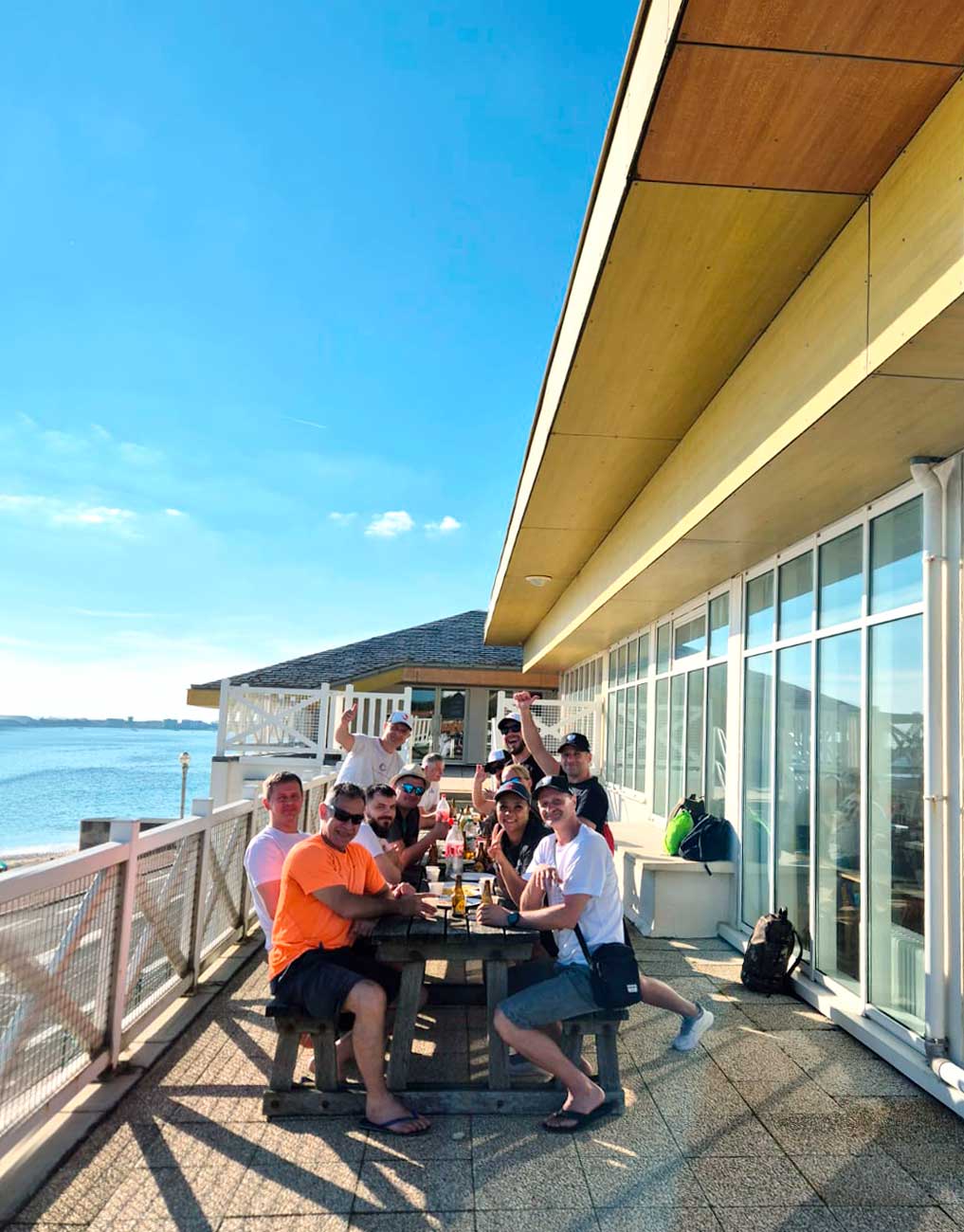
Social gathering © ITKF
“We are very proud to have hosted an event of such relevance to traditional karate. The choice of Les Sables-d’Olonne, a city known for its hospitality and peaceful environment, provided the ideal setting for participants to fully concentrate on activities and the exchange of knowledge. This Master Course not only strengthened the pillars of ITKF, the technical and scientific theory that underpins our practice, but also promoted the spirit of unity, collaboration and cordiality among the different nations present.”
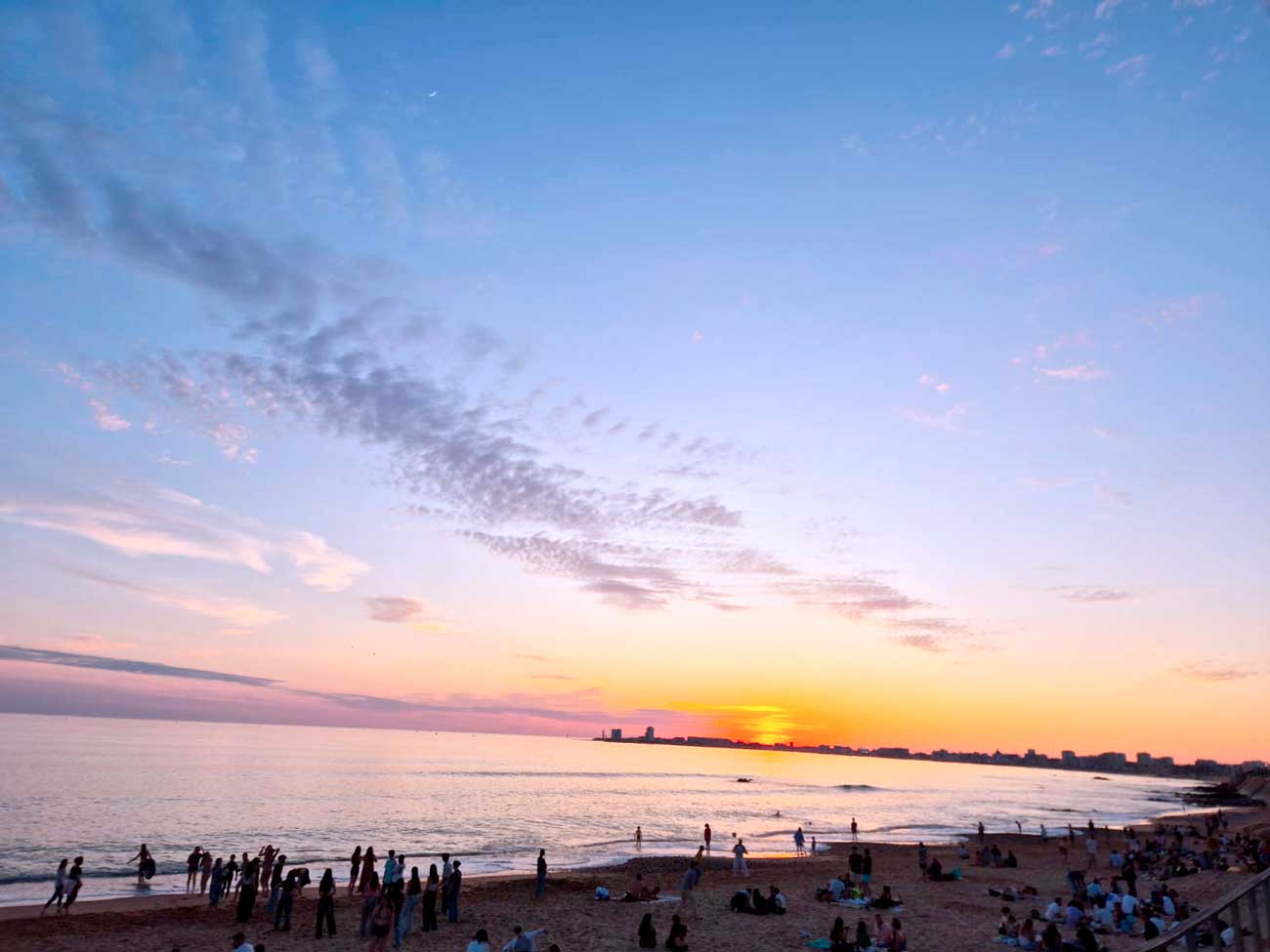
Sunset on the beach of Les Sables-d’Olonne © ITKF
“The Master Course in France is the oldest and most traditional technical event on our calendar. With each edition, we strive to improve the technical quality and hospitality with which we receive participants and this year we took a huge leap in quality. On behalf of the ITKF board, we extend special thanks to the municipal government of Les Sables-d’Olonne and the leaders of the Institute of Ocean Sports, who together made our event possible at the highest level, reminding, of course, that the tradition continues,” concluded sensei Sandrine.

07 de julho de 2025

05 de julho de 2025
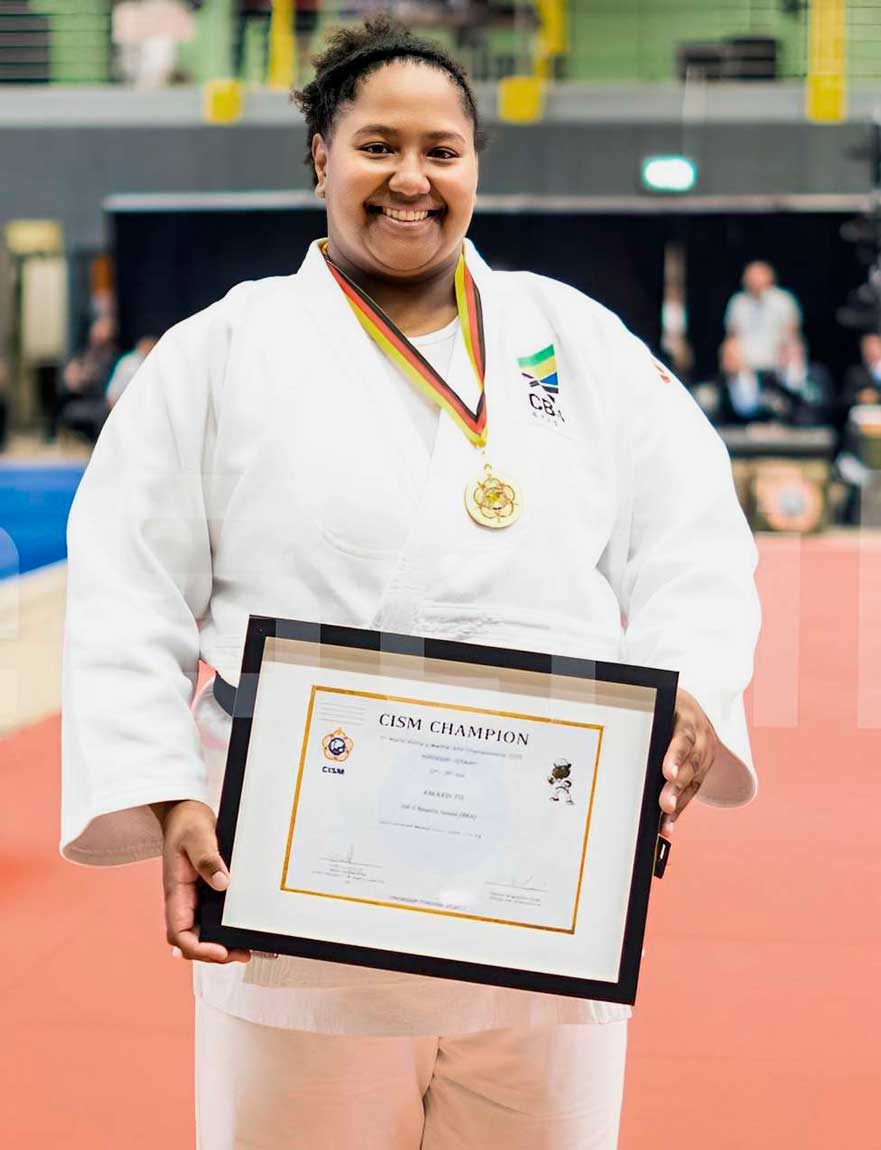
02 de julho de 2025